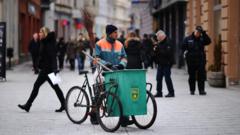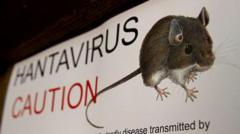**Rat Infestation Sparks Health Crisis in Sarajevo**

**Rat Infestation Sparks Health Crisis in Sarajevo**
Residents raise alarms over a surge in rat-borne diseases, prompting emergency cleanup efforts.
Sarajevo faces a rat infestation leading to increased cases of leptospirosis, with overflowed rubbish and poor sanitation worsening the issue. Authorities have declared an epidemic and are mobilizing efforts to combat the spread of disease, following years of inadequate pest control measures.
**Article:**
Sarajevo is grappling with a significant health crisis linked to a burgeoning rat population, stirring concern among residents and health officials alike. Recent social media posts from locals have highlighted alarming images depicting numerous rodents swimming in the Miljacka river, a major waterway running through the heart of the city.
The grim sight of overflowing rubbish bins and illegal dumping has become commonplace, leading to a breeding ground for rats. Complaints have echoed throughout the city, with many expressing frustration that local authorities have neglected to remove dead animals, some even found in children's play areas.
Health professionals are sounding the alarm as cases of rat-related illnesses surge. The recent spike includes over a dozen instances of leptospirosis reported in just one day at the largest hospital in Bosnia and Herzegovina. The disease, colloquially known as rat fever, spreads to humans through exposure to water or soil contaminated by the urine or droppings of infected rodents. Individuals suffering from this disease can experience various symptoms, including severe headaches, muscular discomfort, and in extreme cases, lung bleeding. The disease can escalate into Weil's disease, leading to jaundice and kidney failure.
In light of the situation, Sarajevo’s local government has declared an epidemic, which has enabled the implementation of urgent measures. There is an ongoing citywide clean-up initiative featuring additional sanitation workers equipped with disinfectants and an enhanced schedule for rubbish collection. Local schools have been instructed to attend to their playgrounds and surrounding areas while also checking for the rat presence in their basements.
This proactive stance marks a stark contrast to the last two years during which pest control efforts in Sarajevo were nonexistent. Officials attribute the previous lack of action to complications stemming from a flawed tender process for pest control contracts, which allowed both rats and stray dog populations to flourish unchecked.
Enis Hasanovic, the Health Minister of Sarajevo Canton, emphasized that the current predicament represents not just a health threat but also a communal challenge stemming from governmental failure to meet essential hygiene standards.
However, concerns persist regarding the potential escalation of health risks. Former director of the Sarajevo's University Clinical Centre, Sebija Izetbegović, now a member of the Sarajevo Canton Assembly, warned that with the rat population thriving, the risk of hantavirus outbreaks could also rise.
Fortunately, thus far, while untreated leptospirosis can be fatal—with a mortality rate exceeding 50% for severe cases—all reported infections in this outbreak have remained non-critical. As Sarajevo confronts this pressing issue, ongoing efforts are necessary to restore public health and safety in the city.
**Article:**
Sarajevo is grappling with a significant health crisis linked to a burgeoning rat population, stirring concern among residents and health officials alike. Recent social media posts from locals have highlighted alarming images depicting numerous rodents swimming in the Miljacka river, a major waterway running through the heart of the city.
The grim sight of overflowing rubbish bins and illegal dumping has become commonplace, leading to a breeding ground for rats. Complaints have echoed throughout the city, with many expressing frustration that local authorities have neglected to remove dead animals, some even found in children's play areas.
Health professionals are sounding the alarm as cases of rat-related illnesses surge. The recent spike includes over a dozen instances of leptospirosis reported in just one day at the largest hospital in Bosnia and Herzegovina. The disease, colloquially known as rat fever, spreads to humans through exposure to water or soil contaminated by the urine or droppings of infected rodents. Individuals suffering from this disease can experience various symptoms, including severe headaches, muscular discomfort, and in extreme cases, lung bleeding. The disease can escalate into Weil's disease, leading to jaundice and kidney failure.
In light of the situation, Sarajevo’s local government has declared an epidemic, which has enabled the implementation of urgent measures. There is an ongoing citywide clean-up initiative featuring additional sanitation workers equipped with disinfectants and an enhanced schedule for rubbish collection. Local schools have been instructed to attend to their playgrounds and surrounding areas while also checking for the rat presence in their basements.
This proactive stance marks a stark contrast to the last two years during which pest control efforts in Sarajevo were nonexistent. Officials attribute the previous lack of action to complications stemming from a flawed tender process for pest control contracts, which allowed both rats and stray dog populations to flourish unchecked.
Enis Hasanovic, the Health Minister of Sarajevo Canton, emphasized that the current predicament represents not just a health threat but also a communal challenge stemming from governmental failure to meet essential hygiene standards.
However, concerns persist regarding the potential escalation of health risks. Former director of the Sarajevo's University Clinical Centre, Sebija Izetbegović, now a member of the Sarajevo Canton Assembly, warned that with the rat population thriving, the risk of hantavirus outbreaks could also rise.
Fortunately, thus far, while untreated leptospirosis can be fatal—with a mortality rate exceeding 50% for severe cases—all reported infections in this outbreak have remained non-critical. As Sarajevo confronts this pressing issue, ongoing efforts are necessary to restore public health and safety in the city.
















